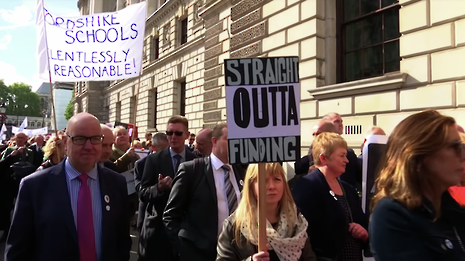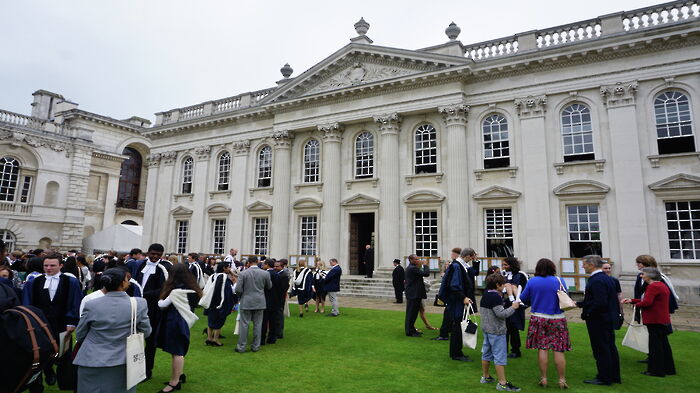State school funding is suffering. We must face this candidly if we are to improve Cambridge admissions
Columnist Charlotte Lillywhite asks to us to reconsider what we have been told about government spending on state education

Last month, the School Standards Minister Nick Gibb claimed that the Conservatives are “spending record amounts on […] school funding”, adding to this that they are “the third highest spender on education in the OECD”. Record amounts of expenditure and the third highest spender? These buzzwords would make you think that the quality of state school education must only be improving, and dramatically at that.
If this is true, why did 2,000 headteachers recently descend on Westminster to demand increased funding for their schools? Why are school leaders being forced to share the workload of cleaners, canteen workers, and bus drivers? What about the General Secretary of the Association of School and College Leaders, Geoff Barton, who declared that it will do “nothing” to address the funding shortage in schools and colleges?
Explanations are in order. The state school system is a critical path to Cambridge for many students – poorer student in particular – and the obstacles it is facing should not be underestimated nor concealed.
“The state school system is a critical path to Cambridge for many students, and the obstacles it is facing should not be underestimated nor concealed”
As it happens, it is easy enough to explain the disparity between the government’s presentation of this funding situation and the reality experienced by state schools and colleges: the figures Gibb used to make his assertions included all types of educational spending, related to school and university, public and private.
The billions of pounds students spend on tuition fees and the extortionate fees wealthy parents pay for their children’s private education were used to comment on the separate matter of government school funding.
These matters must not be treated as equal, as while state school students are suffering, those attending private schools are flourishing.
Funding for 16-19 education in Sixth Form Colleges – a key component in levelling access to the UK’s most coveted institutions – has declined by 22% in real terms since 2010/11, as a London Economics report recently stated, highlighting “the government freeze on sixth form funding combined with a sharp increase in running costs.”
Combined with the Tories’ misleading presentation of the funding situation, this reflects the wider neglect of state education. It suggests a lack of respect and genuine care for state-educated students’ futures and feeds into the not-good-enough mindset commonly found amongst them, where under-funding is building barriers to Further and Higher Education and extra-curricular opportunities.
Just take the recent warning by local councils that music lessons in such schools are under threat unless the government funds a pay rise for teachers. If an extra-curricular opportunity as broad as music could soon become monopolised by children with parents wealthy enough to afford private tuition, this leaves no hope for a broad and diverse curriculum for non-private schools.
But the decline of extra-curricular opportunities is only a drop in the ocean, with the basic quality of education and support – the size of classes, number of teachers and quality of mental health provisions – facing serious challenges. This growing failure is a travesty, when state schools bring together such a wide variety of students whose wide range of talents and abilities remain severely under-supported.
There is simply no excuse for this when private schools enjoy benefits like VAT-exempt fees, while there are students in state education who can’t even afford school meals. It would be completely wrong to assert that the government is trying its best and showing a real depth of care for the students suffering under its funding cuts. Pretending that the situation is better than it is, because the cost of university tuition and private school fees make us the ‘third highest spender’ in the OECD, amounts to a generational stitch-up.
Private school education already has a firm hold on admissions, and this will only get worse if this funding situation is not treated with honesty and due consideration – and this will never be achieved on a shoestring budget.
 News / Right-wing billionaire Peter Thiel gives ‘antichrist’ lecture in Cambridge6 February 2026
News / Right-wing billionaire Peter Thiel gives ‘antichrist’ lecture in Cambridge6 February 2026 Features / From fresher to finalist: how have you evolved at Cambridge?10 February 2026
Features / From fresher to finalist: how have you evolved at Cambridge?10 February 2026 Film & TV / Remembering Rob Reiner 11 February 2026
Film & TV / Remembering Rob Reiner 11 February 2026 News / Churchill plans for new Archives Centre building10 February 2026
News / Churchill plans for new Archives Centre building10 February 2026 News / Epstein contacted Cambridge academics about research funding6 February 2026
News / Epstein contacted Cambridge academics about research funding6 February 2026










